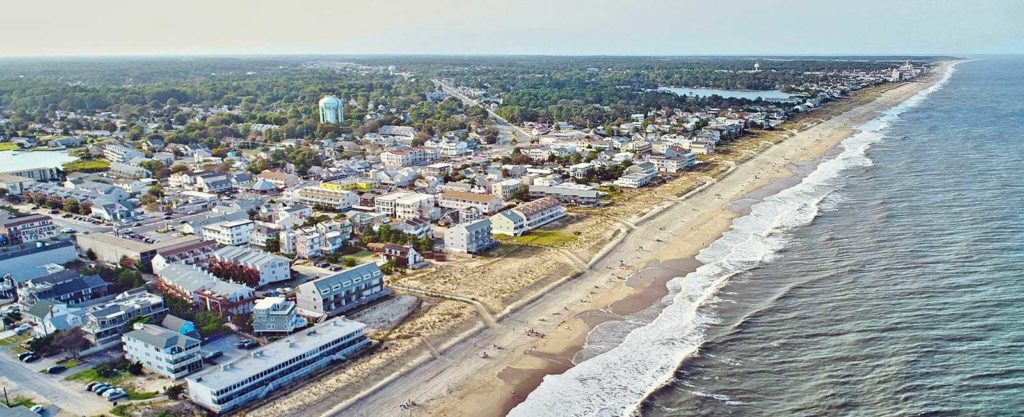Delaware Beach Town Recommends Grease Trap Ordinance
A stormwater study in Rehoboth Beach Delaware uncovered cross-contamination with a sewer line on Rehoboth Avenue. It also found Wilmington Avenue stormwater filters are breeding grounds for bacteria.
The report is Phase III of stormwater sampling conducted by City contractor GHD, an international engineering firm. Stormwater testing was required by Delaware Department of Natural Resources and Environmental Control when it approved Rehoboth’s ocean outfall permits.
During Phase I, GHD studied theoretical modeling, which predicted high levels of bacteria in Rehoboth’s ocean in the hours immediately following a big storm.
During Phase II, GHD took samples from the stormwater drains, which confirmed higher-than-recommended levels of bacteria, but they were lower than predicted. During Phase II, extremely high levels of bacteria were found in the stormwater pipes on Rehoboth, Wilmington, Baltimore and Maryland avenues.
As a result of the sampling, the City found a stormwater vault on Rehoboth Avenue wasn’t working because pumps designed to move the most contaminated stormwater into the City’s sewer system failed.
Recommendations from GHD following this phase included regular maintenance and cleaning; it recommended infrastructure improvements including more permeable pavement, engineered sand filters, flushing of pipes and extending stormwater outfalls in the ocean.
During a commissioner workshop, GHD noted that the city has repaired the Rehoboth Avenue pump, replaced the sand filter on Wilmington Avenue, cleaned portions of the stormwater pipe and begun videoing stormwater pipes. A whole lot of maintenance has been done, she said.
GHD said as a result of the City’s maintenance, problem areas have shown significant decreases in bacteria. GHD said that typically, stormwater has 8,000 colony-forming units per liter. According to a table provided as part of the presentation, the majority of locations tested were under or within small percentages of that threshold.
“It’s amazing how much it’s gone down,” they said.
Testing for human waste was also part of Phase III. GHD said Baltimore and Wilmington avenues came back clean, but three different samples on Rehoboth Avenue detected human waste.
The study results show the custom-made sand filters on Wilmington Avenue continue to have high levels of bacteria. GHD recommended more regular cleaning of the sand filters to start, but also suggested the City consider replacing them.
In a follow-up email, the Public Works Director said the City will continue to identify and eliminate the causes of high bacteria. GHD will continue to be a valuable partner in this effort, he said.
The Public Works Director said the City is now analyzing the method to be used to identify the potential cross-contamination with the sewer system. He said the work should take place in the coming months.
Related to the Wilmington Avenue filters, the Public Works Director said the first thing the City is going to do is replace each of the components within the filters and then retest. He said there were significant problems with tree roots in that stormwater line, so the City wants to make sure that wasn’t a contributing factor to the high levels of bacteria in the filter.
The Public Works Director said in addition to stormwater pipe sampling, GHD and the City conducted public outreach to restaurants to inform them of expectations for cleaning grease traps. A town hall was held for businesses, but only one person showed up, the Public Works Director said.
The Public Works Director said the City’s current fats, oils and grease program for restaurants is simple – have a grease trap and empty it.
The Public Works Director said the biggest issues related to restaurants were trash containers and outdoor cleaning. Trash attracts a lot of birds, and cleaning outside flushes waste down the drain and into the ocean, she said.
To better control waste from restaurants, the Public Works Director recommended the City create a grease trap ordinance that can be enforced, standardize inspections and inspect at random intervals. People within the industry talk, the Public Works Director said, and if one restaurant gets inspected they’ll let the others know.
If you want to keep food solids from clogging your grease trap, consider installing The Drain Strainer. Invented by a former restaurant owner, The Drain Strainer allows your sinks to still drain quickly while capturing the food solids that would normally clog your pipes.
The Drain Strainer also creates an air gap so no sewer backflows can make it back up into your 3-compartment sinks and our food scrap collector is an effective and affordable commercial garbage disposal alternative.

